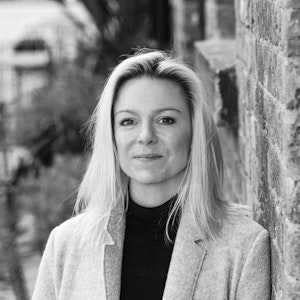Luck of a saint
Emma Heal, MD of Lucky Saint, explores the role of timing, connection and humility in business.
Author
Philippa Richardson
Pip is Founder of The Circle Line, a Transactional Analysis psychotherapist, a former City litigator and a Head of Marketing in the property industry. She works with individuals, leaders and groups to help them function well in life and work, believing that we can all write our own life story.

If you ever interview at Lucky Saint one of the core criteria you’ll be assessed on is whether you’ve been lucky.
For Emma Heal, MD of the breakthrough alcohol-free beer brand, luck is an indicator of a few things: getting results, being generous in life, and humility. When you’re doing what you love, she says, you get results. When you’re generous and grateful you attract others (being thankful was something Emma’s mum taught her from a young age). And when you’re humble you acknowledge the part others play in your success, the role of timing and of luck.
These are the things they look for and hire for - and that have driven this leading business to its stand-out success: their £10m Series A raise in January 2023 was the largest ever alcohol-free beer investment in Europe.
Aligning a supportive team is at the heart of Emma’s role. Firstly, everyone is aligned with their purpose to inspire the world to drink better; “That pulls everyone together” she says. Then, Emma runs an extensive personal learning and development programme, mental health first aid training for all, a Monday gratitude ritual and an intensely thoughtful onboarding process to welcome new joiners.
There's a rhythm to all this connection - every week an all-company roundtable, every fortnight they're randomly paired with someone in the business to swap notes, every quarter a performance review, every 12 months she and founder Luke Boase review their own roles.
Timing is key, she says. For example, when to invest in ATL media: “We’ll only do so when the brand and category is ready, so that it makes a positive impact – getting those decisions right is key”. One of their mantras is ‘Do the right thing well’. “We could have added ‘at the right time’”, Emma says, “A good idea at the wrong time simply won’t work in the same way”. Underpinning the day-to-day timing decisions is their desire for Lucky Saint to be a brand that endures for 100 years. They take the long view, and to go the distance you need to do the right thing or you'll be found out.
But all the programmes and organisation in the world can’t deny the role of synchronicity in business.
"There’s a real dichotomy with luck. On the one hand there’s a lot of humility in being in the right place, at the right time.” Emma says, “And then you make your own luck; the harder you work, the luckier you get.”
"There’s a real dichotomy with luck. On the one hand there’s a lot of humility in being in the right place, at the right time.”
A shining example is when Emma happened to see Radio 1 DJ Greg James’ instagram post pleading for someone to rescue his favourite, then-derelict, local pub in Marylebone. Just the right place at the right time - and a connection that led to a strong supporter and ambassador in James. On another occasion they got lucky with Rankin offering to shoot their first above-the-line campaign for free, a calibre of photographer a start-up could never afford. It’s hard to manufacture that kind of luck.
And yet I can’t help but feel that this “luck” has a lot to do with Emma herself, and the culture her and Luke have created. Hard work alone isn't enough. You have to be able to connect with people: colleagues, high profile personalities, shareholders.
Do toxic businesses get so lucky? Create such valuable connections for free, see good opportunities and make them happen with such grace? I doubt it. It seems to me that toxic businesses succeed financially only, and they do that through power, whether that be capital value, spending power or oppressive employee practices. The bad feeling they create simmers below.
Emma would call herself lucky - and for every bit of luck she is intensely grateful and freely expresses that, which seems to create more of it. She certainly puts the hours in at times - “integrating” work and life, as she calls it. Rather than constantly seeking work/life balance she takes a longer 12-month view, accepting that some times are going to be busier with work than others (opening their pub The Lucky Saint this year, for one), and at other times she needs to focus on being a mum of two.
But to me it seems that Emma and Lucky Saint’s success has very little to do with luck, and a whole lot to do with her positivity, her warmth, her interest in people and psychology (she enthuses about Neuro-Linguistic Programming) and her ability to connect with people.
At the heart of this is, well, her heart. Emma has aligned her deep passion for health and wellbeing with her career. “I genuinely feel good about my job and what I do.” says Emma, “When your work is aligned with your values, you can do it with your whole heart; you’re in”.
“When your work is aligned with your values, you can do it with your whole heart; you’re in”.
A positive people-first culture, hard graft, a quality product, strategic timing, team alignment, all underpinned by a mission to do good in the world - it’s a compelling business model. And looking at the surging seemingly unstoppable success of Lucky Saint, one that can inspire us all.